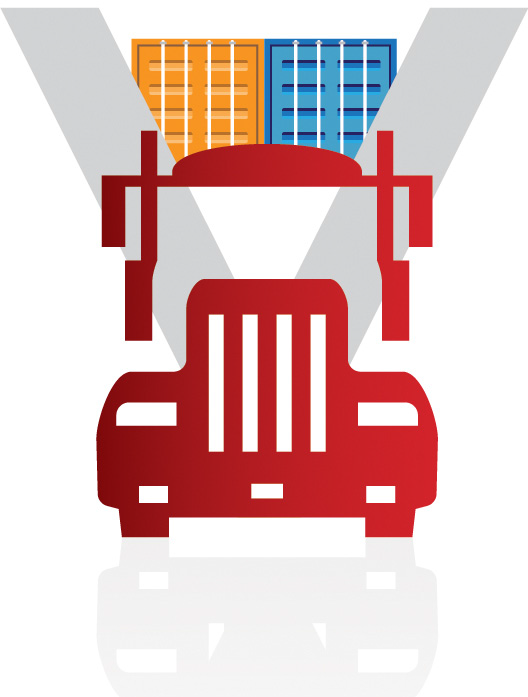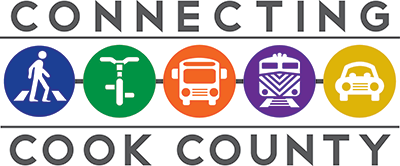The Plan
OVERVIEW
Connecting Cook County provides the framework through which County officials, under the leadership of President Preckwinkle, can plan for the future, advocate for sound transportation policies, and—most importantly—take action. This plan identifies the needs and resources in our communities, the priorities moving forward and the work Cook County is doing to implement these priorities.
Review the full Connecting Cook County Plan or the Executive Summary.Additional information about the planning process is included below.
The Five Priorities
As a result of the planning process, five policy priorities were developed that will shape the County’s transportation policies and capital improvement program.

Improved transit is an essential part of addressing congestion on our roads and meeting the travel needs of residents who cannot afford a car or choose not to have one. Other modes such as walking, biking, car sharing, and ride sharing connect residents to public transportation, schools, stores, work, and more and must be among the options offered to families and businesses when transportation facilities are improved.

Metropolitan Chicago's role as the freight center of North America brings jobs, wages, and sales revenues, but it also presents the challenges of greater congestion, wear and tear on roads and rails, and travel delays. Competitor regions have added strategic capacity and connections to capture a greater portion of growth in the freight sector. As a result, the Chicago region's market share is slipping. To retain its status as a global freight hub, the County will make plans, policies, and rail and trucking investments with strong public benefits.

Regions that are more inclusive—that fully use their human, transportation, real estate, and business assets—achieve greater and more evenly distributed economic growth than less inclusive areas. Within Cook County, transportation services and the opportunities they afford are not equally distributed, which disproportionately affects African Americans and residents of south Cook County. To fully realize equitable distribution of opportunities, the County’s economic development and transportation policies will create a climate conducive to business expansion and to making jobs more broadly accessible.

Striking the right balance between maintenance and modernization of existing transportation facilities and new construction is a challenge. It is tempting to add new capacity, but failure to maintain what already exists increases long-term operating costs, safety hazards, delays, and congestion. Bringing the average pavement quality of County roads up to “good condition” will require an additional $60 million per year for the next 10 years. Cook County will use new practices and technologies to improve the capacity of existing transportation facilities and ensure that today’s investments do not preclude future innovation and growth.

Building the robust transportation network that is so critical to the region’s economic competitiveness depends upon increased, more reliable and flexible revenue sources. In 2015, Cook County took the unprecedented step of ending the long-standing practice of diverting motor fuel tax funds to other uses. Starting in 2017, this action will provide an additional $45 million per year to pursue the priorities described in Connecting Cook County. This first step is part of a campaign to increase funding for transportation from multiple sources, including competitive grants, taxes, tolls, and fares.
Stakeholder Outreach
Public involvement was an essential component of the planning process. Multiple committees met regularly, in addition to public feedback received through surveys and open houses.
- Advisory and Program Committees: Appointed by President Preckwinkle, key civic, labor, transportation, business, urban planning and economic development experts, along with representatives of suburban councils of governments, were involved in the collaborative effort to produce the LRTP. Meeting quarterly throughout the planning process, these transportation partners participated through Advisory or Program Committees, lending their expertise to the planning initiative and helping Cook County redefine how transportation investments are made.
- Peer Review Committee: Several national and international transportation and community and economic development experts agreed to review an early draft of the LRTP in order to lend their expertise and insight to strengthen the Connecting Cook County Plan. These external partners provided feedback and valuable input based upon their professional experiences in other parts of the country and the world, helping to ensure that Cook County’s transportation policies and investments reflect best practices and innovations.
- MetroQuest Public Survey: One of the early activities undertaken was a transportation survey of those who live, work, visit, shop, and/or travel within the County. The survey provided valuable information about the opinions and desires of Cook County’s transportation system users and helped identify countywide transportation gaps and deficiencies.
- Open Houses: Public meetings conducted as Open Houses were held during the planning process as a way to disseminate information about the draft plan and secure feedback. Two series of Open Houses were held, near the beginning and the end of the project.
Schedule

Project Archives and Resources
To view additional information on the planning process and resources, visit the Project Archives and Resources page.

